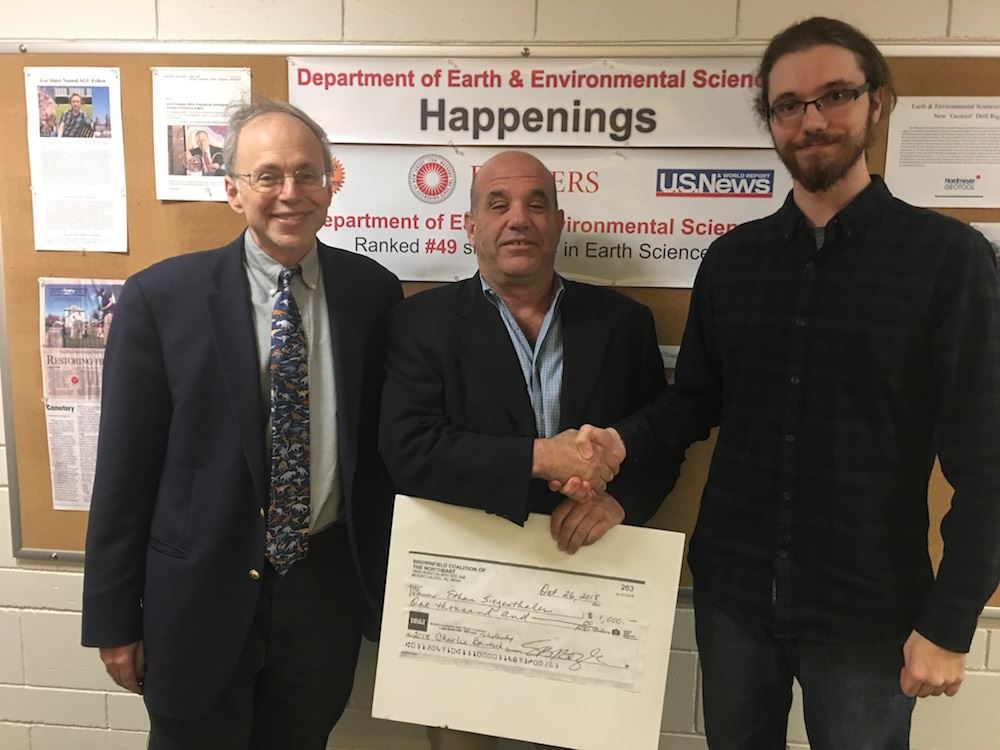By Steve Dwyer
There are your rock formations and there are your career formations. And sometimes they actually meet.
 Ethan Siegenthaler is living proof. Family trips to upstate New York, hiking mountains and closely observing rock formation and their outcroppings—where they come from—set the stage for Ethan to pursue a geology career—a decision made while in high school.
Ethan Siegenthaler is living proof. Family trips to upstate New York, hiking mountains and closely observing rock formation and their outcroppings—where they come from—set the stage for Ethan to pursue a geology career—a decision made while in high school.
That curiosity upstate is paying dividends: The Rutgers University (Newark, N.J.) geology major in November became the first recipient of the Charlie Bartsch Brownfield Scholarship, established by BCONE to honor the legacy of Bartsch, the dynamic and well-loved brownfields industry advocate who passed away suddenly.
A BCONE board member at the time of his passing, Bartsch for decades served as the nation’s passionate voice in promoting the importance of brownfields remediation and redevelopment—the “leading guru” on how to assemble a variety of state and federal incentives to enhance projects of interest to the community.
At the Rutgers ceremony, BCONE President Stephen Jaffe presented Siegenthaler with a $1,000 check, which will be used for various school-related obligations, such as paying for books and courses. After graduation in 2020, Siegenthaler plans to go for his master’s degree and ultimately wants to launch a career in brownfields.
Of Siegenthaler, who was one of three finalists for the honor after the trio submitted lengthy essays, Jaffe remarked, “Ethan’s commitment to the industry and what he put into his essay is what swayed us (the BCONE board). After meeting him, I was even more convinced we made the right decision (among the three finalists). Ethan showed a firm commitment to this industry and is excited about the future. He has a real strong interest in contributing to society in a brownfield way."
In paying homage to the late Bartsch, Jaffe added, “We are excited about continuing our scholarship effort on behalf of Charlie in funding this for students interested in brownfield development. It’s just another way that BCONE is able to give back to the community,” said Jaffee, who noted BCONE will be scouting for other universities in collaboration of future scholarships in 2019 and beyond.
According to Ethan’s professor, Alexander Gates, a geology professor with 32 years’ experience at Rutgers, Ethan “started showing up in my department (for open houses and other occasions) when he was a junior in high school. He was very serious about becoming a geologist,” says Gates, a distinguished service professor and chair of the earth and environmental sciences department.
“Ethan is one of the most enthusiastic students you’re going to find. He’s the first in line when it’s time for field work and projects and has boundless enthusiasm for his pursuit of a geology degree and becoming a professional.”
Gates, whose department has been bestowed with upwards of $8 million in grant funding since 2007, oversees the LSAMP (Louis Stokes Advancement of Minority Participation) program that advocates for getting more lower-income students into the math and science fields. He was approached last spring by BCONE “asking if I would be interested in conducting a competition in my department to bestow this award. I put out a call to the students and asked them to write an essay. Over time, I identified the top three students as finalists for the scholarship and BCONE ultimately made the choice for Ethan.”
The professor says students at Rutgers and other universities in the Tri-State area have a regular chance to witness some of the most environmentally-compromised brownfield sites in the country. With the incidence of pollution prevalent, they can tour these properties, perhaps even be part of university-sponsored programs to problem-solve and assess contamination.
Ethan has taken full advantage of those field trips. “I was fascinated with geology at a very early age,” said Ethan, a resident of Rutherford, N.J., a stone’s throw from Rutgers. “I always knew I wanted to study geology from a young age. My sister attended Rutgers so I wanted to check it out. I had a plan in place.”
At Rutgers, Ethan said it has been a lot of hard work—but a labor of love. He said one geology field trip that made an impact was touring an old manufacturing property near where he lives. Simply put, “I looked at it as a waste of land.”
He said that if, hypothetically, he was a brownfield practitioner today, he would start a Site Investigation by “taking many soil samples to determine if there were cracks in rock—contaminants can bullet through rocks and travel for miles very quickly.”
He said a recent trip to a Newark community garden was a wakeup call because a high incidence of cadmium was discovered. Another time he took a trip along the Passaic River and “was shocked about the lack of cleanup, and how ignoring a pollution or contamination problem only compounds the issue.” He said that his strategy when in the field as a professional would be an aggressive but prudent approach to site remediation—mitigating and correcting without being overly zealous. He knows it’s a balancing act.
And he can’t wait to get started.
Established in May 2018, The Charlie Bartsch Brownfield Scholarship considers undergraduate and graduate students at colleges and universities in the northeast region who have declared their majors in the myriad of fields that work in the brownfields industry: Environmental science, engineering, geology, law, government, real estate, finance, community development, computer science, and Charlie’s academic background: Urban policy and planning and political science.

